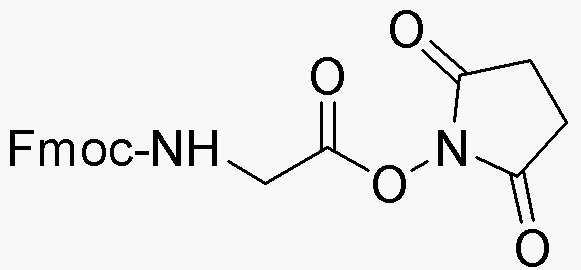Fmoc-glycine N-hydroxysuccinimide ester is widely utilized in research focused on:
- Peptide Synthesis: This compound serves as a key building block in the synthesis of peptides, allowing for the introduction of glycine residues in a controlled manner. Its stability and ease of use make it a preferred choice among chemists.
- Drug Development: It plays a significant role in the development of peptide-based therapeutics. Researchers can modify the structure to enhance bioactivity, leading to more effective drug candidates.
- Bioconjugation: The N-hydroxysuccinimide group facilitates efficient coupling reactions with various biomolecules, making it invaluable for creating targeted drug delivery systems and diagnostic agents.
- Protein Labeling: This ester can be used for labeling proteins with fluorescent tags, aiding in the study of protein interactions and dynamics in biological systems.
- Research in Neuroscience: Its application in synthesizing neuropeptides allows researchers to explore neurological pathways and develop potential treatments for neurological disorders.
General Information
Properties
Safety and Regulations
Applications
Fmoc-glycine N-hydroxysuccinimide ester is widely utilized in research focused on:
- Peptide Synthesis: This compound serves as a key building block in the synthesis of peptides, allowing for the introduction of glycine residues in a controlled manner. Its stability and ease of use make it a preferred choice among chemists.
- Drug Development: It plays a significant role in the development of peptide-based therapeutics. Researchers can modify the structure to enhance bioactivity, leading to more effective drug candidates.
- Bioconjugation: The N-hydroxysuccinimide group facilitates efficient coupling reactions with various biomolecules, making it invaluable for creating targeted drug delivery systems and diagnostic agents.
- Protein Labeling: This ester can be used for labeling proteins with fluorescent tags, aiding in the study of protein interactions and dynamics in biological systems.
- Research in Neuroscience: Its application in synthesizing neuropeptides allows researchers to explore neurological pathways and develop potential treatments for neurological disorders.
Documents
Safety Data Sheets (SDS)
The SDS provides comprehensive safety information on handling, storage, and disposal of the product.
Product Specification (PS)
The PS provides a comprehensive breakdown of the product’s properties, including chemical composition, physical state, purity, and storage requirements. It also details acceptable quality ranges and the product's intended applications.
Certificates of Analysis (COA)
Search for Certificates of Analysis (COA) by entering the products Lot Number. Lot and Batch Numbers can be found on a product’s label following the words ‘Lot’ or ‘Batch’.
Numéro de catalogue
Numéro de lot/série
Certificates Of Origin (COO)
This COO confirms the country where the product was manufactured, and also details the materials and components used in it and whether it is derived from natural, synthetic, or other specific sources. This certificate may be required for customs, trade, and regulatory compliance.
Numéro de catalogue
Numéro de lot/série
Safety Data Sheets (SDS)
The SDS provides comprehensive safety information on handling, storage, and disposal of the product.
DownloadProduct Specification (PS)
The PS provides a comprehensive breakdown of the product’s properties, including chemical composition, physical state, purity, and storage requirements. It also details acceptable quality ranges and the product's intended applications.
DownloadCertificates of Analysis (COA)
Search for Certificates of Analysis (COA) by entering the products Lot Number. Lot and Batch Numbers can be found on a product’s label following the words ‘Lot’ or ‘Batch’.
Numéro de catalogue
Numéro de lot/série
Certificates Of Origin (COO)
This COO confirms the country where the product was manufactured, and also details the materials and components used in it and whether it is derived from natural, synthetic, or other specific sources. This certificate may be required for customs, trade, and regulatory compliance.


